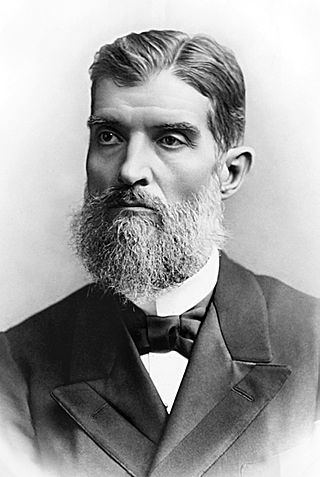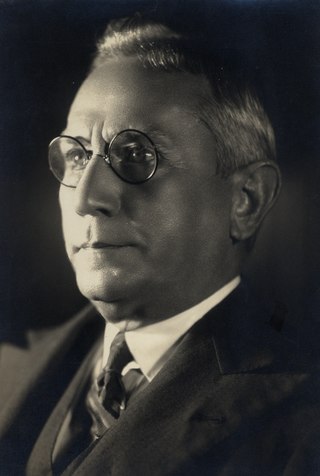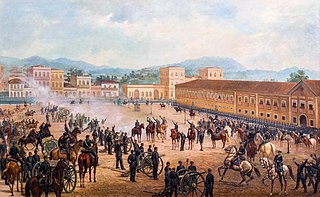
Manuel Deodoro da Fonseca was a Brazilian politician and military officer who served as the first president of Brazil. He was born in Alagoas in a military family, followed a military career, and became a national figure. Fonseca took office as provisional president after heading a military coup that deposed Emperor Pedro II and established the First Brazilian Republic in 1889, disestablishing the Empire. After his election in 1891, he stepped down the same year under great political pressure when he dissolved the National Congress. He died less than a year later.

Floriano Vieira Peixoto, born in Ipioca, nicknamed the "Iron Marshal", was a Brazilian soldier and politician, a veteran of the Paraguayan War, and the second president of Brazil. He was the first vice president of Brazil to have succeeded the president mid-term.

Prudente José de Morais e Barros was a Brazilian lawyer and politician who was the third president of Brazil. He is notable as the first civilian president of the country, the first to be elected by direct popular ballot under the permanent provisions of Brazil's 1891 Constitution, and the first to serve his term in its entirety. His presidency, which lasted from 15 November 1894 until 14 November 1898, was marked by the War of Canudos, a peasant revolt in the northeast of the country that was crushed by the Brazilian Army. He also had to face a break in diplomatic relations with Portugal that was successfully mediated by Queen Victoria of the United Kingdom.

General Augusto Tasso Fragoso, better known as Tasso Fragoso was a Brazilian soldier, judge of the Superior Military Tribunal and writer. During the Revolution of 1930 he was president of the Provisional Government Board of 1930, which ruled Brazil from 24 October to 3 November, between the deposition of President Washington Luis and the inauguration of Getúlio Vargas.
The Brazilian Navy is the naval service branch of the Brazilian Armed Forces, responsible for conducting naval operations.

José Isaías de Noronha was a Brazilian Navy Admiral who briefly served as president of Brazil while being a member of the provisional military junta of 1930. Born into a military family, Noronha took up a naval career. He served aboard ships such as Andrada and Recife and commanded ships such as Piauí, Sergipe, and Minas Geraes. In 1930, he became one of the three members of the military junta which ruled Brazil between October and November 1930. When the junta acquiesced to revolutionaries, Noronha initially remained as minister of the Navy in the administration of President Getúlio Vargas. He was also president of the Naval Club before and after the junta.

The Brazilian Naval Revolts, or the Revoltas da Armada, were armed mutinies promoted mainly by admirals Custódio José de Melo and Saldanha da Gama and their fleet of rebel Brazilian navy ships against the claimed unconstitutional staying in power of president Floriano Peixoto.

The Federalist Revolution was a civil war that took place in southern Brazil between 1893 and 1895, fought by the federalists, opponents of Rio Grande do Sul state president, Júlio de Castilhos, seeking greater autonomy for the state, decentralization of power by the newly installed First Brazilian Republic and, arguably, the restoration of the monarchy.

The Armed Forces of the Empire of Brazil were the overall unified military forces of the Empire of Brazil. The Brazilian military was first formed by Emperor Dom Pedro I to defend the new nation against the Portuguese in the Brazilian War of Independence. The Army and Armada were commissioned in 1822 with the objective of defeating and expelling the Portuguese troops from Brazilian soil.

Almirante Tamandaré was a protected cruiser operated by the Brazilian Navy from 1897 to 1915. The construction of the cruiser was the result of Brazil's effort to develop a large steel ship, but the country had no experience with this type of ship, and the project resulted in an unreliable vessel.

The Proclamation of the Republic, Coup of 1889, or Coup of the Republic was a military coup d'état that established the First Brazilian Republic on November 15, 1889. It took over the constitutional monarchy of the Empire of Brazil and ended the reign of Emperor Pedro II.

Events in the year 1895 in Brazil.

Events in the year 1893 in Brazil.

The Imperial Brazilian Navy was the navy created at the time of the independence of the Empire of Brazil from the United Kingdom of Portugal, Brazil and the Algarves. It existed between 1822 and 1889 during the vacancy of the constitutional monarchy.

The Imperial Brazilian Army was the name given to the land force of the Empire of Brazil. The Brazilian Army was formed after the independence of the country from Portugal in 1822 and reformed in 1889, after the republican coup d'état that created the First Brazilian Republic, a dictatorship headed by the army.

The movement for the re-adoption of monarchy in Brazil has taken place as a series of uprisings and political acts, usually in a fragmented way and peripherally to larger causes. It has been important historically and remains a fast-growing active movement to this day. It advocates restoration of the constitutional monarchy under the House of Orléans-Braganza, a cadet branch of the House of Braganza, which ruled Brazil for 72 years as the kingdom and later Empire of Brazil until the monarchy was abolished in 1889 by a military coup d'état that gave rise to the First Brazilian Republic.

The Battle of Campo Osório, also known as the Combat of Campo Osório, was fought on 24 June 1895 between federalist rebel forces and loyalist troops of the First Brazilian Republic, being the last battle of the Federalist Revolution.

Tertuliano de Albuquerque Potiguara was a Brazilian Division General who was known for being a primary commander of the Contestado War but remained a controversial figure during the war due to being accused of committing war crimes.

Almirante Barroso was a cruiser operated by the Imperial Brazilian Navy and later the Brazilian Navy from 1882 to 1893. Its name is a tribute to Brazilian admiral Francisco Manuel Barroso da Silva, the Baron of Amazonas. Its construction began in 1880 at the Rio de Janeiro Navy Arsenal, being launched into the sea in 1882. The ship was a demonstration of the potential of the Brazilian naval industry at the time, built with a combination of wood and steel.

















